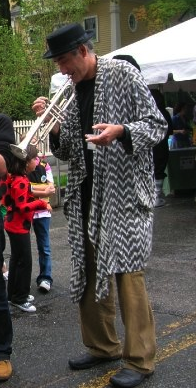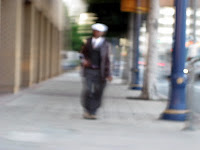 |
| Vote for Herbie |
 Through most of its history, even in its mainstream swing heyday, jazz was considered dionysian enough to be vaguely disreputable. Eventually, you got jazz people invited to the White House and there was even a period when jazzmen were sent abroad as "ambassadors"-never a really comfortable fit, as exemplified by the fact that when Armstrong was photographed in full Ambassador's get-up, he was carrying a briefcase which happened to be full, as he said, of "that fine moota[pot]."
Through most of its history, even in its mainstream swing heyday, jazz was considered dionysian enough to be vaguely disreputable. Eventually, you got jazz people invited to the White House and there was even a period when jazzmen were sent abroad as "ambassadors"-never a really comfortable fit, as exemplified by the fact that when Armstrong was photographed in full Ambassador's get-up, he was carrying a briefcase which happened to be full, as he said, of "that fine moota[pot]."Listening to Brubeck's 1962 album (and unproduced musical) "The Real Ambassadors" wrestle with the wrongs and rights of collaboration with the US government is like observing through a one-way mirror as a group of confused psychologists scratch each other's van dycks.
While there have been many jazz songs about civil rights, injustice, war-Trane's "Alabama," Nina Simone's "Mississippi Goddamn," "Compared to What," by Les McCann-the only jazz title I know of that addresses politicians directly in any way-deprecating or not-is Mingus' "Fables of Faubus." That came at a point when rock and roll had pretty much usurped the mantle of disreputability from jazz.
Jazz musicians, subject to the whims of local, state and federal beaurocracies and law-enforcement, may have been reluctant to shake those trees. Whatever the reasons, the relationship between specifically electoral politics and jazz has been almost non-existent.
With these depressing 2010 mid-term elections upon us, I'd like to recall an odd and for me, lovely moment when jazz and electoral politics became strange bedfellows: Dizzy Gillespie's campaign for President in 1963-64.
-thumb.jpg)
Dizzy had marketed "Dizzy for President" badges as a laugher, to raise money for Core (Congress for Racial Equality), and other civil rights projects under Dr Martin Luther King's direction. But people responded so strongly that Dizzy let it happen and buttons and bumper stickers sprouted in hip enclaves throughout the land. Dizzy's response was perfectly modulated, letting us know in his sly way that he understood and shared with us the multiple layers of irony and seriousness that his participation brought to this mid Vietnam-era election.
Unfortunately, Dizzy's character sealed his fate as a candidate. Too funny, for one thing. Also too wry, too arch, too dedicated to music, weed and worst of all, too honest. Eventually, LBJ beat Barry Goldwater.
Dizzy may have dropped out of the 1964 race, but when I got old enough to vote, in 1968, I wrote his name in on my ballot for President and I was not alone. You may know who won that election: Tricky Dick Nixon and Spiro Agnew. Jazz people: I know how hard it is to take this stuff seriously, but...
 |








 Gillespie opened up the floodgates for jazz musicians who felt that personal taste-including darkly tinted eyewear
Gillespie opened up the floodgates for jazz musicians who felt that personal taste-including darkly tinted eyewear 


















